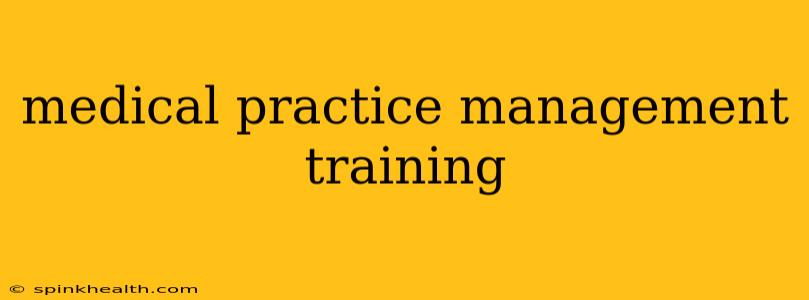The world of healthcare is constantly evolving, demanding more than just medical expertise from practice leaders. Efficient and effective medical practice management is crucial for survival and thriving in today's competitive landscape. This isn't just about balancing the books; it's about creating a patient-centered, high-performing practice that delivers exceptional care while maintaining financial stability. This comprehensive guide delves into the key aspects of medical practice management training, exploring the essential skills and knowledge needed to excel in this dynamic field.
What is Medical Practice Management Training?
Medical practice management training equips individuals with the skills and knowledge necessary to run a successful medical practice. Imagine this: you're not just a doctor, but also the CEO of your own business. This training bridges the gap between clinical expertise and business acumen, covering everything from financial management and regulatory compliance to patient relations and staff management. It's about understanding the intricate interplay between providing excellent care and ensuring the financial health of the practice.
Why is Medical Practice Management Training Important?
Let's paint a picture. You're a brilliant physician, dedicated to your patients. But amidst the daily rush of appointments and charting, you struggle with billing, staff scheduling, and marketing. This is where medical practice management training steps in. It's not just about survival; it's about thriving. Effective training helps you:
- Increase profitability: Learn strategies to optimize revenue cycles, manage expenses, and negotiate contracts.
- Improve efficiency: Streamline workflows, leverage technology, and improve staff productivity.
- Enhance patient satisfaction: Foster a positive and welcoming environment that leads to patient loyalty.
- Stay compliant: Navigate complex regulations and avoid costly penalties.
- Develop a strong leadership team: Build and mentor a high-performing team dedicated to your practice's success.
What are the Key Areas Covered in Medical Practice Management Training?
Effective training programs offer a holistic approach, covering a broad range of crucial areas. Here are some key components:
Financial Management:
- Budgeting and forecasting: Understanding revenue streams, expenses, and projecting future financial performance.
- Billing and coding: Mastering medical billing procedures, coding compliance (CPT, ICD), and maximizing reimbursements.
- Revenue cycle management: Optimizing the entire revenue cycle from scheduling to payment collection.
- Financial analysis and reporting: Interpreting financial data to make informed business decisions.
Operations Management:
- Practice workflow optimization: Streamlining processes to improve efficiency and patient flow.
- Human resources management: Recruiting, training, and managing staff effectively.
- Scheduling and appointment management: Optimizing appointment scheduling to maximize productivity.
- Technology implementation: Integrating technology to improve efficiency, communication, and patient care.
Marketing and Patient Relations:
- Marketing strategies: Attracting new patients and building brand awareness.
- Patient communication: Improving patient satisfaction through effective communication strategies.
- Customer service excellence: Providing outstanding customer service to build loyalty and positive referrals.
- Online presence and reputation management: Leveraging online platforms to enhance your practice's visibility and reputation.
Legal and Regulatory Compliance:
- HIPAA compliance: Understanding and adhering to HIPAA regulations to protect patient privacy.
- State and federal regulations: Navigating the complex web of healthcare regulations.
- Risk management: Implementing strategies to mitigate risks and avoid legal issues.
What Types of Medical Practice Management Training are Available?
The options are diverse to cater to various learning styles and schedules:
- Certificate programs: Focused training leading to a certificate of completion.
- Online courses: Flexible, self-paced learning options.
- Workshops and seminars: Intensive, short-term training sessions focused on specific topics.
- On-the-job training: Hands-on experience within a medical practice.
- Degree programs: More comprehensive programs offering a deeper understanding of medical practice management.
How Can I Find the Right Medical Practice Management Training Program?
Choosing the right program is crucial for your success. Consider these factors:
- Accreditation: Look for programs accredited by recognized organizations.
- Curriculum: Ensure the program covers all the key areas mentioned above.
- Instructors: Check the credentials and experience of the instructors.
- Learning style: Choose a program that aligns with your learning preferences.
- Cost and financing options: Consider the program's cost and available financing options.
Is Medical Practice Management Training Worth the Investment?
Absolutely. The skills and knowledge gained through medical practice management training are invaluable. It's an investment in your practice's future, leading to improved efficiency, increased profitability, enhanced patient satisfaction, and sustainable growth. In a constantly changing healthcare landscape, this training is not just an advantage; it's a necessity. It's about transforming your practice from simply surviving to truly thriving.

